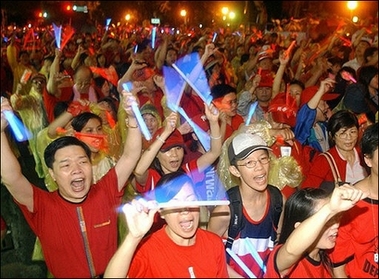TAIPEI - Tens of thousands of
Taiwanese protesters took to Taipei's streets in a bid to step up the pressure
on embattled President Chen Shui-bian to resign over alleged corruption.
They marched a 5.5-kilometer (3.4-mile) route circling Chen's office and
nearby residence amid downpours caused by an approaching typhoon.
|

Protesters give the thumbs down sign during a
demonstration in Taipei. Tens of thousands of Taiwanese protesters took to
Taipei's streets in a bid to step up the pressure on embattled President
Chen Shui-bian to resign over alleged
corruption.[AFP]
|
Many dressed in red, waved flashlights, chanted slogans demanding Chen's
resignation and gesticulated the thumbs-down sign to vent their anger at the
president over a string of corruption scandals.
"Chen already lost the people's trust and he was unfit to rule anymore. He
must quit to save Taiwan," said Michael Huang, 47, who marched with his wife and
two children Friday.
The Huang family and some fellow protesters trod on an effigy of Chen in a
show of anger.
"We must succeed to create a clean and corruption-free Taiwan," said
pro-democracy veteran Shih Ming-teh, who launched the "Million Voices against
Corruption, Chen Must Go" campaign.
"We stand here today in heavy rains because our leader made grave mistakes
... A Bian steps down," Shih told the crowd when he began the rally, referring
to the president using a nickname.
The march started at around 6:00 pm (1000 GMT), one hour early, because a
larger-than-expected crowd gathered outside the presidential office.
It was expected to converge on a square outside Taipei's main railway station
by the end of the march.
Shih's camp, which organized a round-the-clock protest now in its seventh
day, estimated a turnout of nearly 300,000 as of 6:30 pm.
Chen's office said his schedule was unaffected by the protest. It rejected
media reports that the president and his family were to be taken to the Taiwan's
top military command centre for protection.
Some 3,800 riot police were expected to be deployed amid fears that the
protest could trigger clashes between pro- and anti-Chen campaigners.
Shih, a former chairman of Chen's Democratic Progressive Party (DPP), has
said he is prepared to continue his campaign until the middle of 2008, when the
president's term in office expires.
He warned the DPP against mobilizing its supporters to interfere with the
march, saying Chen would bear responsibility for any violence.
The warning came as the anti-Chen movement looked set to spread after unions
vowed to create havoc at the main airport and on highways.
Organisers said thousands would stage a sit-in protest at the entrance of the
airport no later than October 10, Taiwan's National Day.
Premier Su Tseng-chang and Taipei mayor Ma Ying-jeou, also head of the main
opposition Kuomintang, both called for calm ahead of the march and a mass
pro-Chen rally, which is set to take place in Taipei on Saturday.
Chen's troubles started in May after his son-in-law Chao Chien-ming was
detained and later indicted on suspicion of insider trading and taking bribes.
Chen has publicly apologized for Chao's actions but said he would not resign.
Prosecutors then began looking at whether Chen had misused funds intended for
national affairs and questioned him last month.
In June he survived an unprecedented parliamentary vote to topple him, after
the move failed to win the backing of two-thirds of all lawmakers. If passed, it
would have triggered a national referendum on Chen's future.
His wife Wu Shu-chen is also under investigation for allegedly accepting
department store gift certificates in exchange for lobbying efforts.
The independence-minded Chen, first elected in 2000 after more than 50 years
of nationalist Kuomintang rule, narrowly won re-election in 2004 for a second
and final term.